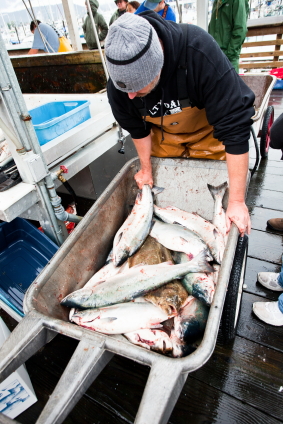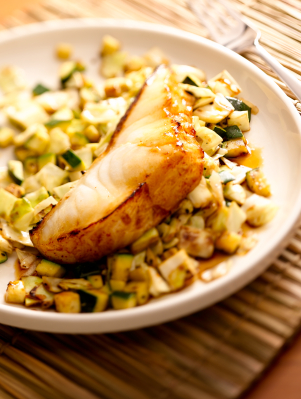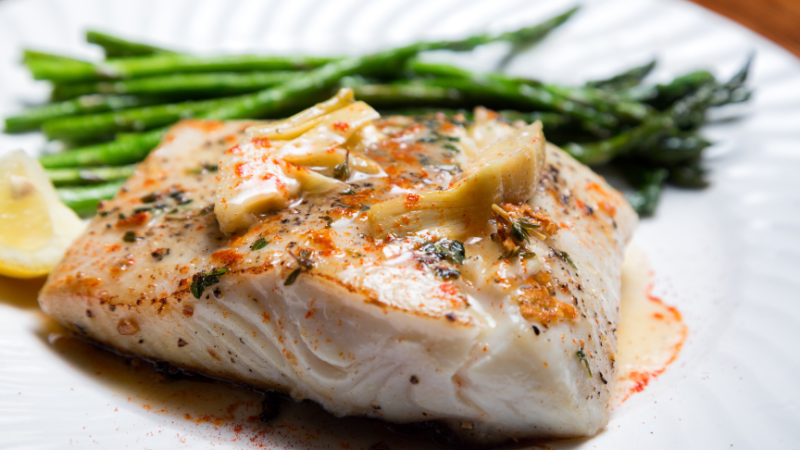In Seattle, Washington, where seafood is plentiful and inexpensive, you can find Alaskan Halibut on just about every restaurant menu. Halibut is as common an entree in Seattle as catfish is in the deep South.
 I am a huge fan of fish and although halibut is a member of the Flounder Family of fish, its taste is superior. Halibut has a mild flavor, a firm but flaky white texture and is a favorite even among those people who aren’t necessarily “fish fans”. There is no “fishy” taste with this premium fish.
I am a huge fan of fish and although halibut is a member of the Flounder Family of fish, its taste is superior. Halibut has a mild flavor, a firm but flaky white texture and is a favorite even among those people who aren’t necessarily “fish fans”. There is no “fishy” taste with this premium fish.
For today’s health-conscious consumer, halibut makes an excellent menu item, as it is high in nutrients and low in overall calories, fat and sodium. A six ounce piece of halibut has 35 grams of protein and only 4 grams of fat.
The health benefits of Omega-3 fatty acids has been touted by doctors and nutritionist alike. Cold-water fish like halibut are a rich source of the omega-3 essential fats. A healthy daily intake of omega 3 fatty acids will help prevent cardivascular disease and systemic inflammation. In fact, infants who do not get enough omega-3 fatty acids from their mothers during pregnancy are at risk for developing vision and nerve problems. Symptoms of omega-3 fatty acid deficiency include fatigue, poor memory, dry skin, heart problems, mood swings or depression, and poor circulation.
The total Omega-3s profile for a six ounce piece of halibut is 777mg with EPA at 121mg and DHA at 496mg – (Eicosapentaenoic Acid and Docosahexaenoic Acid, the two omega-3 fatty acids found in fish oil).
When purchasing halibut or any other fish make sure the fish is wild harvested. Most, if not all, farmed fish are raised in toxic environments and fed foreign and contaminated feed. I also recommend purchasing your seafood from Vital Choice Seafood and Organics for the guaranteed purity of your purchase.
With respect to the issue of mercury, substantial evidence indicates that the risks from mercury in ocean fish are reduced by their high levels of selenium. (Fresh water fish are often low in selenium, and some are high in mercury.) This may be one reason why people in Japan and the Seychelles Islands, who eat far more ocean fish of the same kinds that Americans do, show no signs of harm from mercury.
If you are ever in Seattle and want some awesome perfectly prepared seafood, I recommend Ivar’s Acres of Clams or Ivar’s Salmon House.
If you not are headed to Seattle anytime soon, then the receipe below just may tickle your fancy. Enjoy!
A-Maysing Health to You All

Pineapple-Crusted Halibut
1/2 cup fine-chopped pineapple with its juice (about 4 ounces total)
Fine-grated zest and juice of 1 medium lime
1/4 teaspoon organic cayenne pepper (or crushed red pepper flakes)
1 tablespoon light brown sugar
Pinch sea salt
2 (6 ounce) Halibut portions
Combine the pineapple, lime zest and juice, cayenne pepper,
brown sugar and salt in a medium bowl. Set aside 20 minutes
to allow the flavors to blend.
Preheat the oven to 350 degrees. Line a shallow roasting
pan, large enough to comfortably hold the fish in a single
layer, with aluminum foil or parchment paper and lightly
spray with no-stick cooking spray.
Place the fillets in the pan, skin side down, with 1 to 2
inches between them. Sprinkle each fillet lightly with salt.
Top each fillet with the pineapple mixture, evenly coating
the tops.
Bake about 8 minutes per inch of thickness, until the fish
is cooked through, but not dry. If the topping looks overly
moist (and not crust-like), place the fish under the broiler
1 to 2 minutes to evaporate the excess moisture.
Serve hot.
Makes 2 Servings
Resources:
Vital Choice Wild Seafood and Organics -www.vitalchoice.com
Fight over Mercury Risk Muddied by Bad Science by Craig
Weatherby-Vital Choice Wild Seafood and Organics
The World’s Healthest Foods -www.whfoods.org



